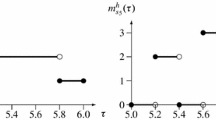Abstract
In the reforms of centrally planned economies (CPEs), variants of thedouble-track system as a transitional measure. While there have been somestudies of the system from the demand side, little effort has been spentby economists to analyze its consequences from the t supply side. Thispaper is an attempt to do so in a disequilibrium framework. We show thatgiven a particular form of plan evasion, it is possible for the plannedprice to affect output, a result which contrasts with that of a generalequilibrium model (Sicular, 1988). Moreover, quantum changes in supplycould take place, generating instability in the system. The model isextended into a two-product case, where we illustrate that supplyinstability may still take place. Some alleviating factors that reducefluctuations are then discussed.
Similar content being viewed by others
References
Alexeev, M. (1988),'Are Soviet consumers forced to save?' Comparative Economic Studies, XXX (4), 17–23.
Bennett, J. (1989), The Economic Theory of Central Planning, Basil Blackwell.
Brus, W., and Laski, K. (1985), 'Repressed inflation and second economy under central planning', in W. Gaertner, and A. Wenig, eds., The Economics of the Shadow Economy, Springer Verlag, Berlin, 377–391.
Burkett, J. (1988), 'Slack, shortage and discouraged consumers in Eastern Europe: estimates based on smoothing by aggregation', Review of Economic Studies, 483–506.
Cheng and Wang Yuk-shing (1992), 'Modelling peasant household behaviour under double-track pricing system in China', Business Research Centre Working Paper Stories, Hong Kong Baptist College, Series No. CS 91017.
Cheng, Yuk-shing and Tsang, Shu-ki (1994), 'The changing grain marketing system in China,' The China Quarterly, No.140 (December), 1080–1104.
Cheng, Yuk-shing, Tsang, Shu-ki and Chan, Man-hung (1993), 'Price responsiveness of Chinese agricultural production under the double-track system', Jingji Yanyiu (Economic Research Journal), Chinese Academy of Social Sciences, January (1), 16–25.
Chen, Hongmin and Wang, Huanchen (1989), 'Hoarding, reselling and dual pricing system', Quantitative and Technical Economics, Chinese Academy of Social Sciences, Vol. 6, December, 31–36.
Dreze, J. and Muller, H. (1980), 'Optimality properties of rationing schemes', Journal of Economic Theory, 23 No(1), 131–149.
Ericson, R.E. (1983), 'On the allocative role of the Soviet second economy', in P. Desai, ed., Marxism, Central Planning and the Soviet Economy, MIT Press.
Grossman, G. (1977), 'The second economy of the USSR', Problems of Communism, September-October.
Hare, Paul G. (1990), 'From central planning to market economy: some microeconomic issues', Economic Journal, 100, 581–595.
Jin, Hehui (1990), 'Plan, market and the supply behaviour of foodgrain of Chinese peasants', Jingji Yanjiu (Economic Research Journal), Chinese Academy of Social Sciences September, 62–68.
Koo, Anthony Y.C. and Obst, Norman P. (1995), 'Dual-track and mandatory quota in China's price reform', Comparative Economic Studies, 37 (1), 1–17.
Kornai, J. (1980), Economics of Shortage, North-Holland, Amsterdam.
Lipton, D. and Sachs, J. (1990), ' Creating a market economy in Eastern Europe: the case of Poland', Brooking Institution Papers on Economic Activity (1), 57–147.
Nuti, D.M. (1986), 'Hidden and repressed inflation in Soviet-type economies: definitions, measurements and stabilisation', Contribution to Political Economics, 5, 37–82.
Pogodzinski, J.M. and Antes, Claudia (1992), 'The transition from central planning to a market economy: A computable general equilibrium model', Economics of Planning, 25 (2), 139–164.
Portes, R. (1989), 'The theory and measurement of macroeconomic disequilibrium in planned economies'. in C. Davis, and W. Charemza, eds., Models of Disequilibrium and Shortage in Centrally Planned Economies, Chapman 27–47.
Portes, R. and Winter, D. (1978), 'The demand for money and for consumption goods in centrally planned economies', Review of Economics and Statistics, 8–18.
Portes, R. and Winter, D. (1980), 'Disequilibrium estimates for consumption goods markets in centrally planned economies', Review of Economic Studies, 137–60.
Shi, Xiaokang (1991), 'Micro-analytics of China's macro-control policies in agriculture', Finance and Trade Economics (Caimao Jingji), December (12), 11–16.
Sicular, Terry (1988), 'Plan and market in China's agriculture commerce', Journal of Political Economy, 96 (2), 283–307.
Stahl, Dale, O., II, and Alexeev, Michael (1985), 'The influence of black markets on a queue-rationed centrally planned economy', Journal of Economic Theory, 35 (2), 234–250.
Tsang, Shu-ki (1990a), 'Controlling money during socialist economic reform: the Chinese experience'. Economy and Society, 19 (2), 217–241.
Tsang, Shu-ki (1990b), 'Monetary Policies under a Double-track System: Some Theoretical Considerations for China,' paper presented at the International Conference: China and Hong Kong at a Crossroads-Prospects for the 21st Century, Hong Kong Baptist College, September.
Tsang, Shu-ki (1990c), 'A note on the aggregation of slack and shortage in centrally planned economies', Economics of Planning, 23 (3), 193–206.
Tsang, Shu-ki (1996), 'Against big bang in economic transition: normative and positive arguments', Cambridge Journal of Economics, 20(2), 183–193.
Wellisz, Stanislaw and Findlay, Ronald (1986), 'Central planning and the “Second Economy” in Soviet-type systems', Economic Journal, 96 (3), 646–658.
Wu, Jinglian and Zhao, Renwei (1987), 'The dual price system in China's industry', Journal of Comparative Economics, 11 (3), 309–318. In Chinese.
Wu, Jianlian (1986), 'Economic fluctuation and the dual system,' Financial Economics, June, 1–8.
Ye, Zhenqin (1992), 'Review and outlook of grain policies in China', Problems of Agricultural Economy, (3), 13–18. Review
Author information
Authors and Affiliations
Rights and permissions
About this article
Cite this article
SHU-KI, T., YUK-SHING, C. Plan Evasion and Supply Instability in a Double-Track System. Economics of Planning 30, 1–16 (1997). https://doi.org/10.1023/A:1002921306229
Issue Date:
DOI: https://doi.org/10.1023/A:1002921306229




